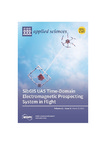Assessment of Cold Ironing and LNG as Mitigation Tools of Short Sea Shipping Emissions in Port: A Spanish Case Study

Use este enlace para citar
http://hdl.handle.net/2183/27656
A non ser que se indique outra cousa, a licenza do ítem descríbese como Atribución 4.0 Internacional
Coleccións
Metadatos
Mostrar o rexistro completo do ítemTítulo
Assessment of Cold Ironing and LNG as Mitigation Tools of Short Sea Shipping Emissions in Port: A Spanish Case StudyData
2021Cita bibliográfica
Martínez-López, A.; Romero, A.; Orosa, J.A. Assessment of Cold Ironing and LNG as Mitigation Tools of Short Sea Shipping Emissions in Port: A Spanish Case Study. Appl. Sci. 2021, 11, 2050. https://doi.org/10.3390/app11052050
Resumo
[Abstract] By the end of 2025 European ports are required to provide (Directive 2014/94/EU) facilities to ensure the Liquefied Natural Gas (LNG) use and on-shore electricity supply for vessels (Cold Ironing—CI). Even though this involves considerable port investment, many uncertainties about CI and LNG performance exist because their application depends on vessel operators’ willingness. Additionally, lag times for CI connection/disconnection along with methane emissions from LNG undermine their feasibility for Short Sea Shipping (SSS). Since, among the SSS aims are the reduction in berthing times and its effectiveness for-inter-islands’ traffic where, land electricity grids are frequently dependent on the fuel burning generation by penalizing the CI performance. This paper introduces a calculation method to evaluate the pollution savings in monetary terms by CI and LNG use in SSS. The method is applied to three European routes by testing the environmental performance of two fleets: feeder and Ro-Pax vessels. The results show that feeders reach higher environmental improvements by using port mitigation than Ro-Pax vessels. Additionally, the need for ensuring the sustainability of on-shore grids before the CI implementation was evinced, especially in insularity frameworks, where the environmental benefits from LNG use proved to be more effective
Palabras chave
Short sea shipping
Cold ironing
On-shore power supply
LNG
Port sustainability
Cold ironing
On-shore power supply
LNG
Port sustainability
Versión do editor
Dereitos
Atribución 4.0 Internacional
ISSN
2076-3417






